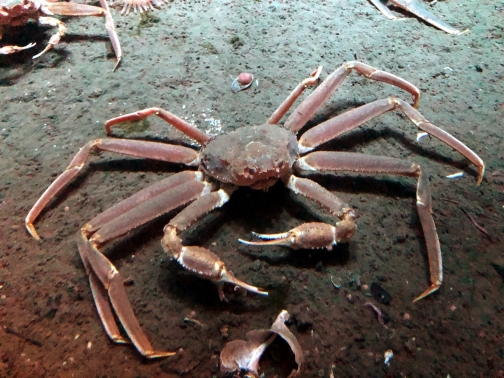29 de noviembre de 2023

The sudden closure of the east Bering Sea snow crab fishery for the 2022-2023 season, and now extended for the 2023-2024 season, shocked stakeholders, scientists, and other fisheries experts around the world. For a fishery once worth $132 million per year and popularized by the reality-tv show Deadliest Catch, the speed, social impact, and potential longevity of this collapse is reminiscent of the closure of Newfoundland cod in 1992 where over 30,000 people lost their jobs overnight. But compared to cod and many other fishery collapses that have historically been caused by overfishing, scientists recently published findings showing that the collapse of Bering Sea snow crab was likely a result of starvation driven by warming waters. The authors of the study dubbed climate change, “the next existential crisis for fisheries,” with snow crab, “a prime example for how quickly the outlook can change for a population.”
But perhaps, in 2023, we shouldn’t be so surprised at devastating collapses and closures of fisheries like east Bering Sea snow crab. From lobsters, to forage fish, to great whales, climate change has been causing drastic shifts in the health and distribution of marine life around the world for years, “stirring chaos” for fisheries along the way.
When the ocean had absorbed over 25% of CO2 emissions and 90% of excess heat from climate change by 2022, it’s only logical that some of the earliest detectable impacts of climate change are observed in the sea. Impacts on marine biodiversity from marine heatwaves and other phenomena are not only an outcome of climate change, scientists also observe that the responses are so rapid, widespread, and precise that they can serve as useful indicators of its progress in near real-time. Marine biodiversity and coastal communities can also be impacted from climate change related acidification, eutrophication, extreme storms, and other impacts. The evidence is clear: climate change is a present threat for fisheries everywhere, and the danger will likely become more severe. Even more resilient fishes, such as tunas and other highly migratory species that have widespread ranges and can tolerate a range of ocean temperatures, are expected to face significant contractions in suitable habitat, among other potential shifts in distribution.
What can fisheries do to prepare? Fortunately, scientists have tackled this very question for several years, and there is a growing wealth of knowledge and resources available. Among a diversity of pathways for how fisheries can individually build resilience, recent research has highlighted the overarching importance of effective governance (including adaptive management and long-term planning), ecosystem-based fisheries management, and utilizing the best available science. Social equity and resilience are also frequently integrated into climate change adaptation plans, and should be a feature of climate change resilient fisheries as well, including conflict resolution for disputes ignited by climate-change driven species range shifts.
Harvest strategies, or management procedures, are an example of one type of management tool that can facilitate adaptive management and can achieve several characteristics of climate resilient fisheries simultaneously:
These benefits for climate change resilience have been top of mind for us at HarvestStrategies.org as we work with Regional Fishery Management Organizations (RFMOs) to implement harvest strategies around the world. We are encouraged to see four of the five tuna-RFMOs have also formalized climate change advisory committees or workplans to more directly integrate climate change considerations into research and management (Table 1, see below).
But while there have been many accomplishments building climate change resilience in recent years, there is still more to be done. From November 30th to December 12th, governments from around the world will convene in Dubai for the 28th United Nations Climate Change Conference (COP28). Food sustainability is a major focus at this year’s event, including how to reduce carbon footprints and also make food production more resilient to climate change impacts, especially in developing countries. Over 3 billion people rely on fish for 20% of their daily protein intake, with some coastal communities up to 70%. With most tuna production from low-cost species such as Skipjack, these efforts to improve fisheries sustainability are important to both environmental conservation and global food security. COP28 is a reminder that climate resilient fisheries – and tools like harvest strategies that can help achieve them – play a central role in a broader conversation on how to achieve a food-secure, sustainable future for the planet.
Table 1: tuna-RFMO climate change resolutions
| RFMO | Measure | Description |
| Western and Central Pacific Fisheries Commission (WCPFC) | Resolution 2019-01 | Adopted in 2019, resolves to consider potential climate change impacts on highly migratory fish in the region, consequences on economies and food stability for relevant communities, support additional science on climate change impacts, and other actions. |
| The Indian Ocean Tuna Commission (IOTC) | Resolution 22/01 | Adopted in 2022, commits to consider the potential impacts of climate change on tuna stocks, bycatch, and other species in the ecosystem in the development of new measures, support further scientific research on climate change and tuna stocks, for the Scientific Committee to advise the Commission on climate change when requested, and other activities. |
| International Commission for the Conservation of Atlantic Tunas (ICCAT) | Resolution 22-13 | Adopted in 2022, a commitment to consider climate change impacts on target stocks, support additional climate change-focused research and data collection, consider how fishing activity may be impacted by climate change, and other activities, and to initiate the climate change work “without delay” including climate change focused meetings beginning in 2023. |
| Inter-American Tropical Tuna Commission (IATTC) | Resolution C-23-10 | Adopted in 2023, a commitment to include climate change as an agenda item for the Working Group on Ecosystem and Bycatch (EBWG), the Scientific Advisory Committee (SAC), the annual Commission meeting, the next science strategic plan, and other activities. |